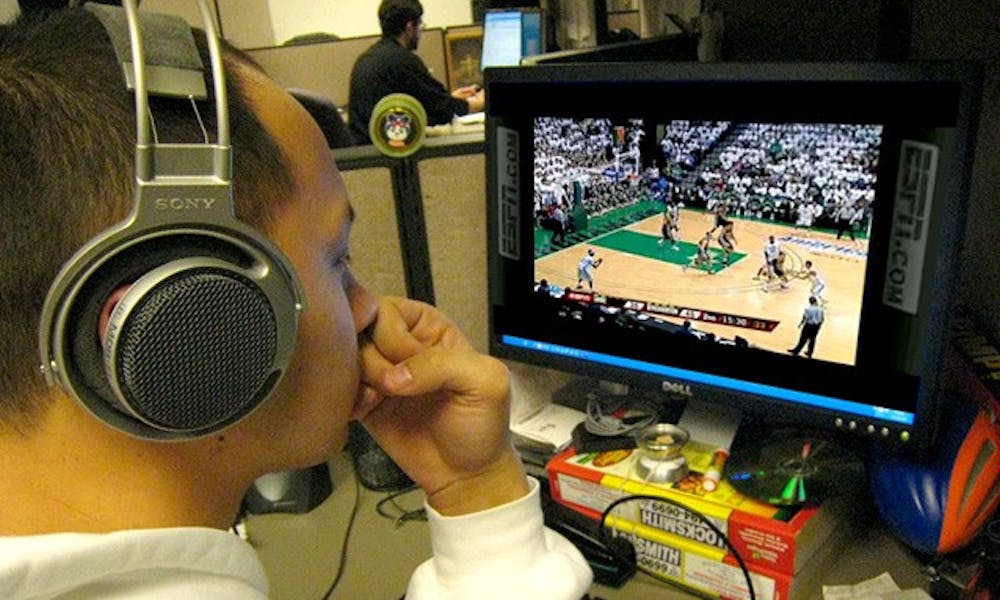Don’t feel badly about slacking off on work during March Madness—you’re expected to.
A survey conducted by Charles Clotfelter, professor of economics and law and Z. Smith Reynolds professor of public policy, indicates that research activity on college campuses drops significantly immediately before the NCAA Division I Men’s Basketball Tournament.
Clotfelter’s survey used data from more than 78 research libraries across the country over three years, beginning in 2006. Results showed that the number of articles viewed on JSTOR, a digital library of academic journals, fell an average of 6 percent in the week after Selection Sunday, the day when seeds for the tournament are announced.
“You could look at it as a reduction of productivity,” Clotfelter said. “But I think of it as a rearrangement of work.”
Clotfelter said he thinks the conversation generated by the competition is healthy, adding that the “bracket effect” is alleviated by the fact that those participating in it are able to anticipate the time they will spend on the tournament and can therefore plan ahead by rescheduling work-related tasks.
“Even though I’m an economist, I’m not against people being happy,” he said.
Still, similar studies have predicted a drastic loss of productivity for American companies in the weeks during which the tournament is held.
Challenger, Gray & Christmas, an outplacement consulting organization, estimated last week that American firms will suffer up to $1.8 billion in lost productivity as a result of this year’s tournament.
“If people spent just 20 minutes a day watching their pool, filling it out, doing research on it, watching the game, streaming video on their computers, going to sports bars, talking around the water cooler, it would cost employers over $363 million per day,” said John Challenger, chief executive officer of Challenger, Gray & Christmas.
As a way of combating these costs, some firms have instituted measures to prevent their employees from participating in tournament-related activity in the office.
T. Vanderbilt, an integrated marketing agency, uses Spector Pro, a monitoring technology, to observe its employees’ activity online and block streaming video.
“When you’re sitting at your desk working, we really need you to be working,” said President and Chief Creative Officer Thomas Vanderbilt.
The company has allowed its employees to take “mental breaks” to watch a plasma display installed in its office, he added.
A survey released last week by staffing agency OfficeTeam indicated that the tournament has the effect of boosting company morale without much detriment to productivity. Of more than 1,000 managers interviewed for the survey, 56 percent said the tournament had no negative impact on productivity and 32 percent said it had a somewhat positive effect on company morale.
Kati Gustafson, OfficeTeam’s Raleigh division director, noted these results were largely the result of increased employee interaction during March Madness.
“Whether they’re in a different department or their job description doesn’t really [usually] allow for interaction between one employee and another, there’s a lot of opportunity for employees to have discussions,” she said.
But Vanderbilt questioned some of these conclusions, noting that the basketball phenomenon has had the detrimental effect of creating “factions,” dividing employees from different colleges, as well as basketball fans from their less sports-oriented colleagues.
He suggested that in lieu of sports-oriented activities, companies could create charity events to rally employees around a common cause.
“That boosts morale and productivity versus something that’s sports-driven, religious-driven or very one-sided,” he said.
For sports-centric universities like Duke, Challenger has given up on the possibility of any productivity at all in March.
“You might as well just shut down the school for a couple of weeks,” he said.
Get The Chronicle straight to your inbox
Signup for our weekly newsletter. Cancel at any time.

